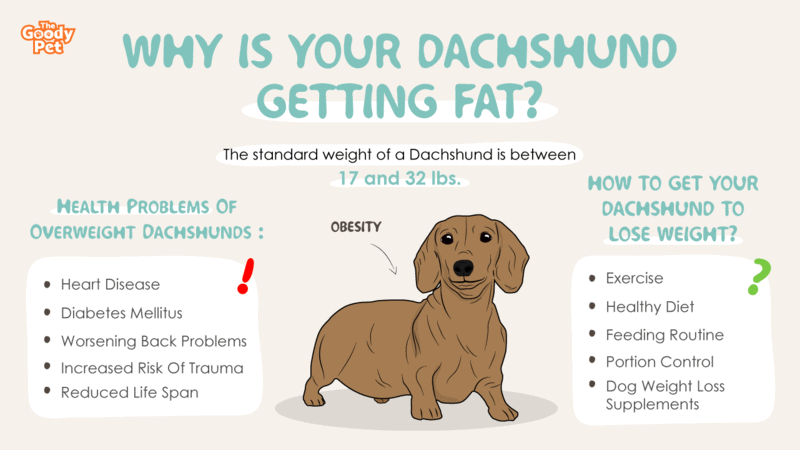Doxies are among the most active dogs out there and I guess it is to be expected from dogs that were bred for hunting and outdoor work in general. It therefore did not make that much sense to me when I found out that one of the leading causes of ill health and death with Dachshunds is obesity.
I mean how can this firecracker of a dog not burn through all the calories they take in? The answer is simple; it is all a balance of genetics, build and your care practices. Let’s see how.
Obesity is one of the biggest health issues faced by small dogs like dachshunds. Despite having playful and active personalities they are prone to being overweight for several reasons.
It is more often than not as a result of inadequate exercise associated with other conditions that affect mobility. It may be due to an unhealthy diet or poor feeding practices in terms of quantity and frequency.
Finally, the weight issues may be as a consequence of other hormonal disorders like diabetes and hypothyroidism.
This is a serious problem with often fatal consequences for your doxie. The good news is that there is a lot you can do to prevent or reverse it. Let us take a closer look at the problem and what you can do to lighten the load for your pooch (pun intended).
What Is Overweight For A Dachshund?

In order to define what it means for a doxie to be overweight it is important to understand the normal weight ranges for healthy dogs in this breed. The ideal weight for a dachshund depends on a variety of factors.
The first of these is age. At the time of their weaning around 2 months, a doxie weighs between 1.3 to 3.5 lbs. Due to their active lifestyle, dachshunds are always hungry and go through rapid growth spurts. By the time they hit maturity at 12 to 18 months they can weigh anywhere from 16 to 32 lbs.
Another important determinant of weight is the size specific type of weenie. Rabbit dachshunds are the smallest and weigh 6 lbs or less. The standard dachshund on the other hand will weigh between 17 and 30 lbs while large doxies sometimes weigh above 32 lbs.
With these figures in mind, an overweight dachshund dog can therefore be defined as one above its weight limits for the age and specific size variant. This is, of course, assuming that the dog is not pregnant.
In addition to the weight, you can also tell whether or not your dachshund is overweight by inspecting them physically. Overweight dachshunds often have fat rolls all over the body which changes their overall silhouettes from lean to rounder. This is the case particularly around the back, neck, shoulders and base of the tail.
Finally, you could use the oldest trick in the book which is checking for palpable ribs. If you cannot feel any of them this is a sign that the dog is overweight due to the thick fat padding.
Health Problems Of Overweight Dachshunds

Being overweight is not only uncomfortable for the doxie but could also be dangerous. This is because of the numerous associated health issues. Here are a few of them to help emphasize on the need to handle the situation as soon as possible.
Heart Disease
This is one of the most common and often most fatal consequences of obesity and weight issues in general when it comes to doxies. It takes different forms with the main being cardiac failure due to clogging of arteries which could lead to sudden death.
Diabetes Mellitus
This is associated with unhealthy diets. With time, the dog develops insulin resistance which affects a lot from metabolism and energy levels to things like healing and the health of blood vessels.
Worsening Back Problems
Due to their small build, dachshunds carry most of their weight on their back. This is associated with several back problems including intervertebral disc disease. The more weight the back has to support the worse symptoms like pain and immobility become.
Increased Risk Of Trauma
Being overweight significantly increases your furry little friend’s chances of getting hurt. This is because the extra weight reduces their agility and speed. So where they could easily have maneuvered or run away they are left at the mercy of gravity and other forces.
Reduced Life Span
Finally, being overweight in general has been shown to reduce the overall lifespan of the dog. Overweight dachshunds live for around 12 years compared to the 14 to 16 average of their healthy weight counterparts.
How Can I Get My Dachshund To Lose Weight?
Clearly, there is a lot at stake here. If you do not want your beloved bestie in excruciating back pain or to die because of a heart attack then you have to do something about the situation right away. Fortunately for you, there is a lot you can do to help the weenie lose weight. And the best part is that you have their playful personalities and decent metabolism to work with for better results. Here are a few things you could try out to help your doggy.
Exercise
It is all about calories in and calories out and there is no better way to burn the fat than through exercise. Fortunately for you, these dogs love the outdoors and playing with their human buddies. Just start small with simple games and short walks as you allow the dog to build up strength and stamina.
Healthy Diet

What you feed your doxie matters a lot too and it is always best to stay away from dog foods rich in carbs and fats. If you are dealing with an overweight pooch, the trick is to switch them out to nutritious and filling but low carb foods. This lowers their calorie intake and with the exercise you should have your dog back to healthy weight in no time.
Feeding Routine And Portion Control
In addition to what you feed them, limiting the frequency of meals will help you a lot. This doesn’t mean that you starve your dog and have them surviving on one small meal per day. Just ditch the free feeding methods where you leave the food available for the dog to eat whenever they want as this promotes overeating.
Instead, establish a routine and stick to recommended portions. With an adult doxie, 1 cup of food spread over 3 meals per day should do the trick.
Dog Weight Loss Supplements
In addition to providing additional nutrients like vitamins, minerals and healthy fats with few calories, they often contain superfood ingredients with fat burning capabilities. They are definitely worth a try with healthy dieting and exercise.
What Should I Feed My Overweight Dachshund?
Food control is one of the most important and effective secrets to helping your overweight dachshund lose weight in a healthy way. A good diet for an overweight dachshund should be low in carbs and fats. This allows other methods like exercise to help with burning the fat without the burnt layers being immediately replaced by unhealthy eating habits.
Another fantastic tip when it comes to feeding your overweight doxie is to stick with high fiber and complex sugar options. High fibers in addition to helping with gut health have a filling effect. This will come in handy for appetite control as one meal will keep your dog satisfied for a long time. Complex sugars like whole grain on the other hand provide much needed energy that is released over extended periods of time so your dog is unlikely to suffer from periods of hypoglycemia.
You should also feed your overweight dachshunds foods rich in lean proteins. This helps to build muscle which is important for exercising for weight loss. It also reduces the load on the doxie dog’s already weak and overburdened back.
Hill’s Science Diet Perfect Weight Small Dog Food is the best example of all these aspects of a healthy diet. The chicken-based dog food is made from all-natural ingredients and is specially formulated to help with weight loss in small dogs.
Finally, you could consider including dog weight loss supplements into your obese sausage dog’s diet to help them with the weight loss. You could get them as chewable treats, capsules or even powders.
LifeStages Dog Multivitamin Powder is one such multipurpose supplement you could look into. It is beneficial not only for weight management but also for skeletal health and gut function. The best part is that the fiber-rich supplements have no filler calories.
How Do I Keep My Dachshund Healthy?
Shedding those extra pounds and reducing the fat pads on your doxie does not mean that your job is done. You have to maintain continuous and intentional efforts to maintain that healthy weight. The steps would also come in handy if you are dealing with an already healthy dog to avoid having to deal with such problems later on.
The first and most important step is to stay active. These dogs instinctively love to play and to spend time in the great outdoors. So indulge your dog in a little time at the park or a game of fetch every now and then. These small efforts make the world of a difference ensuring that your dog remains healthy.
It is also important to establish and stick to a healthy meal plan. Find a dog food that provides all the required nutrients without any unnecessary fats and carbs. In fact if you can simply avoid grains as these are often very calorie-dense.
Ketona Dry Dog Food is a fantastic option to consider in this case for puppies and adult dachshunds. The formula is grain free and low in carbs, sugar and fats. It is also rich in proteins which is key for muscle development for a stronger and more active doxie.
Finally, make sure you take care of the dog’s overall health. Some conditions like hypothyroidism and intervertebral disc disease could inadvertently result in obesity either by affecting metabolism or mobility. Whatever the case, taking care of the root of the problem will save you and your pooch a whole lot of stress down the line.
Related Questions
What Is The Ideal Weight For A Dachshund? This depends on the age and size type of the dog. For adult Dachshunds over 18 months in the standard doxie size group, the average weight range is between 16 to 32 lbs. Anything above or below this range is problematic and may result in serious health consequences for the little doggy.
Are Dachshunds Fussy Eaters? For the most part, dachshunds are not fussy eaters. They are not very likely to go rummaging through trash for scraps or anything like that. However, they do not regularly refuse most dog foods or homemade recipes. This makes finding the right food for them based on nutritional value a lot easier.
Can Dachshunds Drink Milk? Most doxies are lactose intolerance and as a result should not drink milk despite the fact that so many of them like it. When they consume milk and other dairy products, the consequences vary from simple stomach upsets to vomiting and diarrhea. If you notice such symptoms when weaning the pups then simply avoid feeding them milk from that point on.





